翻译过程:理解与表达
翻译的过程

翻译的过程The Process of Translation翻译的步骤Warming-up Exercises1. They gave the boy the lie.2. Fire goes wherever it can, but it prefers to follow a draught.3. The room was easily traced by the noise that was coming from it.4. I shall not expect you until I see you.参考译文1. 他们指责男孩说谎。
(他们指责男孩编造的这个谎言。
)2. 火是无孔不入的,可是它更爱窜入通风的地方。
3. 循声而去,便轻而易举地找到了那间屋子。
4. 你随便什么时候来吧。
翻译的过程通常包括理解、表达和校核三个阶段。
在翻译实践中,理解是表达的前提,但理解与表达通常是互相联系、相辅相成的统一过程,不能截然分开。
译者在理解原文的同时,也在选择表达方式;在表达的同时,又会进一步加深理解。
Three steps of translation翻译的三个步骤1.理解理解是翻译过程的第一阶段。
它既包括对语言现象、文化现象的理解,又包括逻辑关系的理解,对有可能发生歧义的语句要善于分析,进而做出正确判断。
例1:He allowed the father to be overruled by the judge, and declared his own son guilty. ( overrule: rule against)译文1:他允许法官驳倒父亲,宣布他自己的儿子有罪。
译文2:法官的责任感战胜了父子私情,他还是宣判(自己的)儿子有罪。
例2:If we try to implement these harebrained ideas (that English should be replaced by Hindi and the 15 recognized state languages), India will become a Tower of Babel. (harebrained: very foolish)译文1:如果我们试图实施这些轻率而愚蠢的主张,以印度语和其他15种官方承认的各邦语言取代英语的话,印度就会成为一座通天巴别塔。
翻译的过程

?
?1. 语义分析
? 语义分析(Semantic Analysis)是语言 分析的一个分支,说明处在一定语境中, 按照一定次序排列的词项之间的语义关系, 探索词项的意义。把握好原语的全部意义, 是翻译成效的关键。
? 1)首先,必须注意词的概念意义(Conceptual Meaning) 和关联意义(Associative Meaning)。
翻译的过程
一般认为,翻译过程包括两个阶段:正确理解 (Accurate Comprehension )和充分表达( Adequate Representation )。前者是后者的前提,后者是前者 的结果,两者是有机的统一,是使译文符合“忠实、 通顺”的翻译标准的必备条件。
一、理解阶段
? 理解(comprehension)可分为广义理解和狭义理解。广义 理解指对原文作者的个人、原文产生的时代背景、作品的内容 以及原文读者对该作品的反映。狭义的理解仅指对原作文本的 理解。这中理解主要包括语法分析、语义分析、语体分析和语 篇分析(grammatical analysis, semantic analysis, stylistic analysis and text analysis)。理解是翻译成功与否的先决条件 和重要步骤,务必正确可靠,杜绝谬误。
1. Diligence is the mother of good luck.勤勉是幸运之源。 2. No news is good news. 没消息就是好消息。 3. A stitch in time saves nine. 小洞不补大洞吃苦/一针不缝九针难补,及时处理事半 功倍。
翻译中的理解与表达

收稿 日期 : 0 -11 2 60 .6 0
译者往往要摆脱原句结构 的束缚 , 用符合汉语 习 惯的句式来表达原句 的意思。有时 , 译者还要摆 脱原文文化因素的束缚 , 采用符合汉 民族文化特
作者简介 : 谭卫 国( 9 3 ) 男 , 15 . , 湖南邵东人 , 上海师范大学外 国语学院教授 , 主要从 事应 用语 言学 和翻译学 研究 。
动态过程。从逻辑学 的角度看 , 翻译过程是第二 次思维创作 的过程 , 译者运用 自己的语言知识 、 文 化知识和对世界 的认 识对原文信息进行 逻辑推 理, 步步深人 , 直至透彻理解为止 , 同时, 通过逻辑 思维选择最佳的语言表达形式。翻译过程大体上 可分为理解、 表达 、 校核三个步骤或三个阶段 。理 解 和表 达是 翻译 过 程 中 的两 个 至 关重 要 的 阶段 。 本文首先谈谈理解和表达 的相互关系, 然后从宏
译者首先需要解决的是理解方面的问题。理 解应该以语篇为单位。就整篇文章或整个作品而 言, 需要透彻理解的方面颇多。在笔者看来 , 根据 需要理解的内容 , 这个阶段又可分为宏观理解和 微 观理 解两个 层次 或两个 分 阶段 。
2 1 宏 观 理 解 .
充分地把握原文是翻译的基础 。宏观理解是
关 系, 即理解是表达的前提 , 准确的表达来 自.确的理解。在.确理解的前提下, f i - f i - 表达是关键。
文章接 着阐述宏观理解的方方面面, 具体谈论篇章类型和作品风格的宏观理解; 然后探讨微观 理解的几个方面, 即对原文词义、 词语 的分隔、 长句难 句的微观理解等。文章最后论证表达的 重要性和基本的表达方法。文章认为 , 译文的理想境界是形神兼备, 应尽 可能采用直译法处
第三讲 翻译的过程
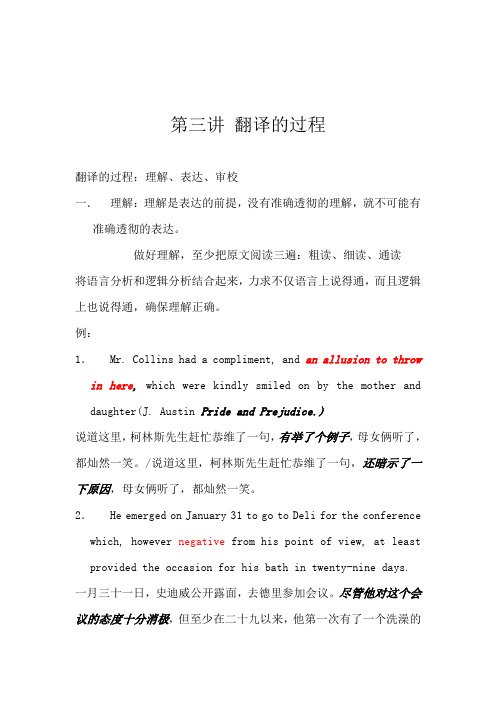
第三讲翻译的过程翻译的过程:理解、表达、审校一.理解:理解是表达的前提,没有准确透彻的理解,就不可能有准确透彻的表达。
做好理解,至少把原文阅读三遍:粗读、细读、通读将语言分析和逻辑分析结合起来,力求不仅语言上说得通,而且逻辑上也说得通,确保理解正确。
例:1.Mr. Collins had a compliment, and an allusion to throw in here, which were kindly smiled on by the mother and daughter(J. Austin Pride and Prejudice.)说道这里,柯林斯先生赶忙恭维了一句,有举了个例子,母女俩听了,都灿然一笑。
/说道这里,柯林斯先生赶忙恭维了一句,还暗示了一下原因,母女俩听了,都灿然一笑。
2.He emerged on January 31 to go to Deli for the conference which, however negative from his point of view, at least provided the occasion for his bath in twenty-nine days. 一月三十一日,史迪威公开露面,去德里参加会议。
尽管他对这个会议的态度十分消极,但至少在二十九以来,他第一次有了一个洗澡的机会/这次会议在他看来不管有多么消极,至少为他提供了二十九天以来第一次洗澡的机会.3.“ And you are my uncle, then!” she cried, reaching up to salute him(E. Bronte: Wuthering Heights).“这么说,你是我姑父啦,”她嚷道,走到他跟前,行了个礼。
4.Clare stool still, and inclined his face towards hers.“ Oh, Tessy! ” he exclaimed!The girl’s cheeks burned to the breeze, and she could not look into his eyes for the emotion( T. Hardy: Tess of the d’Urberxilles)克莱站住了脚,把脸歪到她那一面。
翻译的过程

翻译基础理论(5)——翻译过程西方七个翻译过程模式一、奈达的逆转换模式三个阶段: 分析(analysis) 、转换( transfer) 和结构调整(restructuring)关于转换或换码过程,奈达逆转和简化了乔姆斯基的转换生成过程,认为翻译的转换在核心句层次上进行,具体过程是: 原文的表层结构转换→原文的深层结构( 核心句) 转换→译文的深层结构( 核心句) 生成→译文的表层结构。
二、贝尔的“心理语言学模式”贝尔将翻译分为两个阶段:①通过句法、语义和语用分析( analysis) ,将源语语篇分解为“普遍的( universal) ”、“非具体语言的( non-language-specific) ”和“语义表述( semantic representation) 三部分”;②将小句在“语义表述”中的信息依次进行语用、语义和句法综合( synthesis) ,变成译语语篇。
用简图表示为: 源语语篇分析→语义表述综合→译语语篇。
贝尔把自己的模式称作“心理语言学模式”,并曾用一个比喻来形象地解释他的翻译模式: 翻译的过程好比冰块(原作) 先融化(阅读) ,后重新凝固(翻译) 。
三、目的学派的“环形翻译模式”“环形翻译模式( the looping model) ”是德国目的学派的代表人物诺德提出来的,其起点和终点都是译语情景。
翻译过程是:①分析译语语篇的目的(skopos) : 译语语篇的目的由翻译的发起人(initiator) 确定,包括译语的情景和功能等;②将源语语篇“分析(analysis) ”成“与翻译有关的源语成分(translation-relevant ST elements) ”;③转换( transfer) ;④综合成译语语篇(TT synthesis) 。
用简图表示为: 分析译语语篇的目的→分析源语语篇→转换→译语综合→译语语篇。
这就意味着每向前一步,译者都要“回头看看(look back) ”刚刚分析过的因素。
翻译与翻译过程
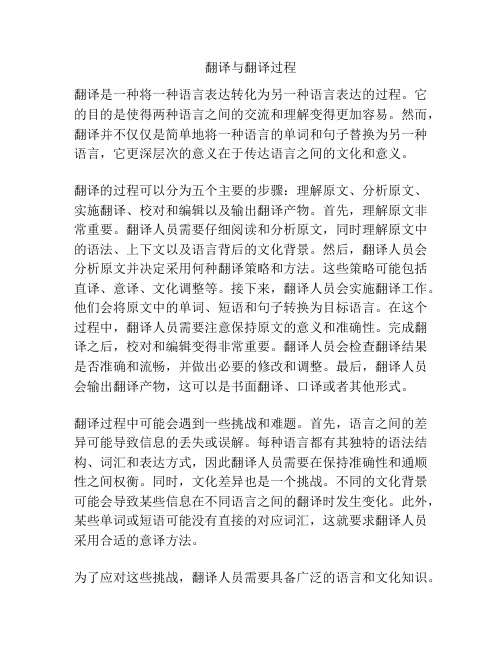
翻译与翻译过程翻译是一种将一种语言表达转化为另一种语言表达的过程。
它的目的是使得两种语言之间的交流和理解变得更加容易。
然而,翻译并不仅仅是简单地将一种语言的单词和句子替换为另一种语言,它更深层次的意义在于传达语言之间的文化和意义。
翻译的过程可以分为五个主要的步骤:理解原文、分析原文、实施翻译、校对和编辑以及输出翻译产物。
首先,理解原文非常重要。
翻译人员需要仔细阅读和分析原文,同时理解原文中的语法、上下文以及语言背后的文化背景。
然后,翻译人员会分析原文并决定采用何种翻译策略和方法。
这些策略可能包括直译、意译、文化调整等。
接下来,翻译人员会实施翻译工作。
他们会将原文中的单词、短语和句子转换为目标语言。
在这个过程中,翻译人员需要注意保持原文的意义和准确性。
完成翻译之后,校对和编辑变得非常重要。
翻译人员会检查翻译结果是否准确和流畅,并做出必要的修改和调整。
最后,翻译人员会输出翻译产物,这可以是书面翻译、口译或者其他形式。
翻译过程中可能会遇到一些挑战和难题。
首先,语言之间的差异可能导致信息的丢失或误解。
每种语言都有其独特的语法结构、词汇和表达方式,因此翻译人员需要在保持准确性和通顺性之间权衡。
同时,文化差异也是一个挑战。
不同的文化背景可能会导致某些信息在不同语言之间的翻译时发生变化。
此外,某些单词或短语可能没有直接的对应词汇,这就要求翻译人员采用合适的意译方法。
为了应对这些挑战,翻译人员需要具备广泛的语言和文化知识。
他们需要熟悉源语言和目标语言的语法和词汇,并了解不同文化之间的差异。
此外,他们还需要不断学习和提升自己的翻译技巧。
在今天的全球化世界中,翻译的作用变得越来越重要。
翻译不仅仅是将语言翻译为另一种语言,它更是一种跨文化交流和理解的桥梁。
翻译帮助人们更好地理解不同语言和文化,促进了国际合作和交流。
因此,翻译人员起着非常关键的作用。
他们通过他们的工作,帮助人们实现语言和文化之间的桥梁,促进了跨国交流和合作的发展。
翻译的过程是什么
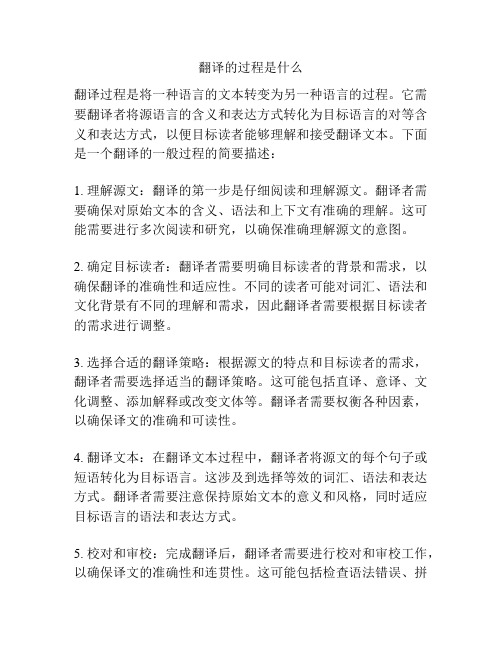
翻译的过程是什么翻译过程是将一种语言的文本转变为另一种语言的过程。
它需要翻译者将源语言的含义和表达方式转化为目标语言的对等含义和表达方式,以便目标读者能够理解和接受翻译文本。
下面是一个翻译的一般过程的简要描述:1. 理解源文:翻译的第一步是仔细阅读和理解源文。
翻译者需要确保对原始文本的含义、语法和上下文有准确的理解。
这可能需要进行多次阅读和研究,以确保准确理解源文的意图。
2. 确定目标读者:翻译者需要明确目标读者的背景和需求,以确保翻译的准确性和适应性。
不同的读者可能对词汇、语法和文化背景有不同的理解和需求,因此翻译者需要根据目标读者的需求进行调整。
3. 选择合适的翻译策略:根据源文的特点和目标读者的需求,翻译者需要选择适当的翻译策略。
这可能包括直译、意译、文化调整、添加解释或改变文体等。
翻译者需要权衡各种因素,以确保译文的准确和可读性。
4. 翻译文本:在翻译文本过程中,翻译者将源文的每个句子或短语转化为目标语言。
这涉及到选择等效的词汇、语法和表达方式。
翻译者需要注意保持原始文本的意义和风格,同时适应目标语言的语法和表达方式。
5. 校对和审校:完成翻译后,翻译者需要进行校对和审校工作,以确保译文的准确性和连贯性。
这可能包括检查语法错误、拼写错误、表达不清和与源文不一致的问题。
校对和审校可以通过自我校对或找其他人进行校对来完成。
6. 修订(如果需要):校对和审校之后,翻译者可能需要进行修订工作,以改进和完善译文。
这可能涉及修改译文中的问题、重新研究源文和目标文之间的表达差异或重新阅读相应的文献。
7. 文化适应:在进行跨文化翻译时,翻译者还需要注意文化适应。
这可能包括了解不同文化的习俗、信仰和价值观,并根据目标文化的要求对译文进行调整。
文化适应是确保翻译能够在目标文化中传达原始文本的含义和目的的重要环节。
总而言之,翻译过程需要翻译者通过深入理解源文、选择适当的翻译策略、转换为目标语言、校对和审校,并进行适当的修订和文化适应来实现源文和目标文之间的准确和有效的转化。
英语翻译的步骤The Procedures for Translation
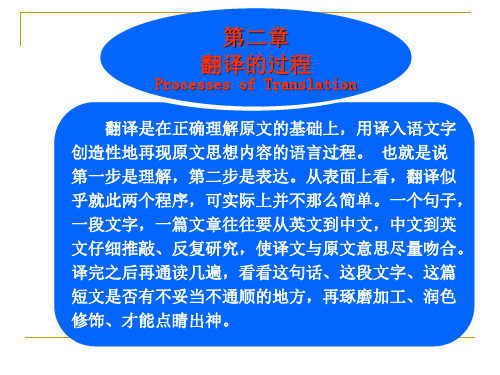
4. Her bright red hat killed the quiet colour of her dress. 5.That killed him around here. 6. He is killing me. 7. The troops of the two countries are kept at arm‟s length. 8.If I want you I‟ll ask for you.
理解之后--表达
How to give an exact representation after you have acquired accurate comprehension: 表达是理解的继续和升华,表达的好坏与理解 的深度,译文语言的熟练程度,翻译技巧的掌 握程度有关.
2. 2. 1 关键词的表达
The question before the house is one of awful moments to our country. 摆在全体代表面前的是关系到我国危急存亡的 重大问题。 The boys have their respective future dreams. 那几个少年对未来各有梦想。 The nursing of the sick ,said Nightingale, is a vocation as well as a profession. 南丁格尔说:看护患者不仅是一种职业,更是 天职。
准确理解是确切表达的前提,理解的诸多 方面如图所示。词义的选择
固定搭配、成语、短语、惯用词组 理解 歧义 矛盾修辞 逻辑关系 夸张 重复 平行结构 正确理解语言现象, 不仅要了解句子的字面意义,还要 了解句子的内涵意义。必须上下有联系地、全面地理解原 文的词汇含义、语法关系和逻辑修辞。不能孤立地看待一 句一词,因为同一个词或一个词组,在不同的上下文和不 同的语法结构中,往往有不同的含义。有时不同词义的词 却被认为是同义词,而同一词在不同的上下文中又产生了 不同的含义。 篇章 段落 词句
英语翻译的步骤The_Procedures_for_Translation
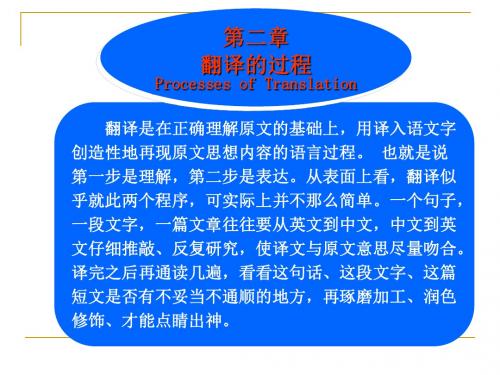
二. 理解逻辑关系
翻译是逻辑活动,翻译作品是逻辑活动的 产物.理解原文是一个极其复杂的过程,译 者是用他的全部知识和智能来理解一个 句子的. 理解一个句子必须经过语义辨认,语法分 析和逻辑分析三个方面的交互作用.
汉语的词汇更加五彩纷呈
例如:1.遇事和大家商量. “matter”, “affair”, “thing” , “deed”, “business” “problems” Consult the masses when problems arise. 2.从他的话音里,我能听出点东西来. I could tell something from the tone of his voice.
Processes of Translation 翻译是在正确理解原文的基础上,用译入语文字 创造性地再现原文思想内容的语言过程。 也就是说 第一步是理解,第二步是表达。从表面上看,翻译似 乎就此两个程序,可实际上并不那么简单。一个句子, 一段文字,一篇文章往往要从英文到中文,中文到英 文仔细推敲、反复研究,使译文与原文意思尽量吻合。 译完之后再通读几遍,看看这句话、这段文字、这篇 短文是否有不妥当不通顺的地方,再琢磨加工、润色 修饰、才能点睛出神。
准确理解是确切表达的前提,理解的诸多 方面如图所示。词义的选择
固定搭配、成语、短语、惯用词组 理解 歧义 矛盾修辞 逻辑关系 夸张 重复 平行结构 正确理解语言现象, 不仅要了解句子的字面意义,还要 了解句子的内涵意义。必须上下有联系地、全面地理解原 文的词汇含义、语法关系和逻辑修辞。不能孤立地看待一 句一词,因为同一个词或一个词组,在不同的上下文和不 同的语法结构中,往往有不同的含义。有时不同词义的词 却被认为是同义词,而同一词在不同的上下文中又产生了 不同的含义。 篇章 段落 词句
翻译过程及语言特点

3)Tom is now with his wife in Chicago. It is already 5 years since he was in New York City. 他现在同妻子住在芝加哥;他在纽约市居住已 经五年了。 汤姆现在同妻子住在芝加哥,他不在纽约住已 经五年了。
理解困难
理解困难
C. 缺乏文化、专业知识 缺乏文化、 We have a sales force at present of twentyfour salesmen on the road, each with his own territory. 目前我们有一支由24名推销员组成的推销队正 在途中,每人有他自己的推销领域。 目前我们有一支由24名外勤推销员组成的推销 队伍,每人有自己的推销地盘。
B. 分析结构 分析结构——抓主干、加成分 抓主干、 抓主干 翻译长句时,要首先理清主句 从句,弄懂句子的主要结 主句和从句 主句 从句 构,确定主谓(宾)关系 确定主谓( 关系,然后再逐一分析句义 逐一分析句义,将意思 确定主谓 逐一分析句义 翻译出来。一般说来,英语长句结构比较复杂,常带多个 从句或冗长的定语和状语。因此,翻译长句时, 首先要运用"化整为零 化整为零"的方法,通过语法分析抓住主谓结 化整为零 构,弄清定语、状语、补语的修饰关系; 然后根据上下文弄清句义的层次和逻辑关系 层次和逻辑关系; 层次和逻辑关系 最后用恰当的汉语准确表达出句意。进行英译汉时不能固 定一种方法,必须灵活运用翻译技巧 灵活运用翻译技巧,对句子进行综合处 灵活运用翻译技巧 理。
2. …when he was a young fellow in the sixties. 当他还是个60多岁的年轻小伙子时 多岁的年轻小伙子时。 当他还是个 多岁的年轻小伙子时。 年代, 在60年代,他还年轻时。 年代 他还年轻时。 3. The object did not move because I pushed it. 因为我推了它,该物体才没有移动。 因为我推了它,该物体才没有移动。 不是因为我推了它,该物体才移动。 d much in seeing you. There was no love lost between us at any time. 2. We grumble a little now and then , to be sure. But there’s no love lost between us. 1.我向来不大想看到你,我们两人之间大概什 我向来不大想看到你, 我向来不大想看到你 么时候都不曾有过好感。 么时候都不曾有过好感。 2.当然啦,我们有时也免不了争论几句,但是 当然啦, 当然啦 我们有时也免不了争论几句, 我们还是相亲相爱。 我们还是相亲相爱。
浅论翻译理解与表达的“身临其境”
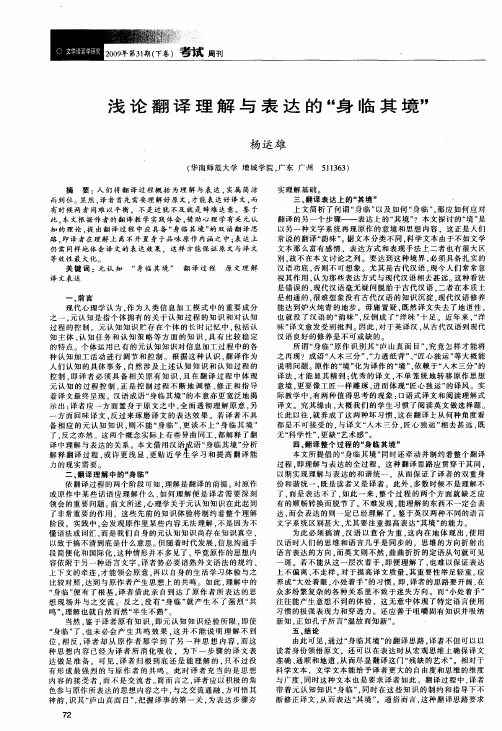
等 效性 最 大化
关 键 词 :元 认 知 “ 临 其 境 ” 翻 译 过 程 原 文 理 解 身 译 文表 达
前 言 现 代 心 理 学 认 为 . 为 人 类 信 息 加 工 模 式 中 的 重 要 成 分 作 之 一 . 认 知 是 指 个 体 拥 有 的关 于 认 知过 程 的 知 识 和 对 认 知 元 过 程 的控 制 。元 认 知 知 识 贮 存 在个 体 的 长 时 记 忆 中 , 括 认 包 知 主体 、 知 任 务 和认 知 策 略 等 方 面 的 知 识 , 有 比 较 稳 定 认 具 的特 点 。个 体 运 用 已有 的 元 认 知 知识 对 信 息 加 工 过 程 中 的各 种 认 知 加 工 活 动 进 行 调 节 和 控 制 。 根据 这 种 认 识 , 译 作 为 翻 人们认知的具体事务 。 自然 涉 及 上 述 认 知 知 识 和认 知 过 程 的 控制 。 即译 者 必 须 具 备 相 关 原 有 知 识 , 在 翻 译 过 程 中 体 现 且 元 认 知 的 过 程 控 制 , 是 控 制 过 程 不 断 地 调 整 、 正 和 指 导 正 修 着 译 文 最 终 呈现 。汉语 成语 “ 临其 境 ” 本 意 亦更 宽泛 地 揭 身 的 示 出: 者应一方面置身于原文之中 , 面透彻理解原 意 , 译 全 另 方 面 回味 译 文 。 过来 琢 磨 译 文 的 表 达 效 果 。若 译 者 不 具 反 备相应 的元认知知识 , 不能“ 临”更谈 不上 “ 临其境 ” 则 身 , 身 了 , 之 亦 然 。这 两 个 概 念 实 际上 有 些 异 曲 同工 , 解 释 了翻 反 都
实用翻译技巧:翻译的过程

翻译的过程是理解和表达的有机结合。
1、翻译的关键在于对原文的理解,要真正理 解原文,译者必须有扎实的语言功底和相关 专业背景知识,并熟知英汉两种文化知识, 否则译者就the Real Thing.(美国可 口可乐广告)
不能打败真正的商品。
四、翻译的标准
• 翻译的标准就是衡量翻译质量的尺度。 • 19世纪末,严复提出的“信达雅”。
faithfulness, smoothness, elegance • 到鲁迅提出的“信与顺”,一直到现在翻译
界普遍接受的“忠实与通顺”,是一脉相承 的。
• 文学作品:文字修养细腻、优美、手法灵活。 • 科技文章:简明、术语性强。 • 应用文:格式较固定,有自己的常用句型和用词方法。 它的原则精神是注重“7C”。即: • ①completeness(完整) • ②clearness (清楚) • ③concreteness(具体) • ④conciseness (简洁) • ⑤courtesy (礼貌) • ⑥correctness (正确) • ⑦consideration(体谅)
• 现任行政人员在作风上与前任大不相同。
• 上面讲的翻译过程,同样适用于汉译英。但 由于两种语言上的差异,汉译英的步骤是:
• ①首先弄清汉语句子(或文章)的意思,弄 清翻译要求;
• ②确定该用什么英语句型来翻译; • ③确定关键词的译法; • ④检查译文英语句子是否符合英语语法; • ⑤检查拼写和标点符号。
挡不住的诱惑!
后者简单明了地把原文的真正含义表达了 出来,从而达到打动消费者的目的。
• 2、表达阶段就是译者把自己从原文所理解 的内容用目的语重新表达出来。
• 表达的好坏主要取决与对原文的理解深度 和对译文语言的修养程度,在理解的基础上 ,用贴切的语言进行表达。
翻译技巧如何准确翻译句子与表达意思

翻译技巧如何准确翻译句子与表达意思翻译是英语学习中非常重要的一部分,准确翻译句子与表达意思是一个需要掌握翻译技巧的关键。
本文通过介绍一些翻译技巧,帮助读者提高翻译能力,准确翻译句子和表达意思。
一、了解上下文在进行翻译的过程中,了解上下文是非常关键的。
上下文可以提供宝贵的信息,帮助翻译者理解原文的含义。
通过了解上下文,可以更准确地翻译句子和表达意思,避免产生歧义。
二、理解语法和语义语法和语义是翻译的基础。
在进行翻译时,需要准确理解原文的语法结构和词义,才能正确地表达出来。
熟悉语法规则和词汇用法,并且不仅仅局限于字面意思,是翻译准确性的关键。
三、运用等效词汇在翻译句子和表达意思时,经常会遇到一些词汇难以直接翻译成另一种语言。
这时,翻译者可以运用等效词汇,选择与原文语义相近的词汇来翻译。
通过使用等效词汇,可以准确表达原文的意思,确保翻译的准确性。
四、理解文化差异不同的语言和文化之间存在差异,同样的句子在不同的语言中可能需要不同的表达方式。
因此,在进行翻译时,了解目标语言的文化背景和习惯用法是很重要的。
通过了解文化差异,可以更准确地翻译句子和表达意思,避免产生误解。
五、注重细节翻译是一个注重细节的过程。
翻译者需要注意语言的细微差别,避免使用词义模糊或者表达不准确的词汇。
同时,注意标点符号和语气的运用,可以有效地传达原文的语境和情感。
六、多练习熟能生巧,只有通过不断地练习才能提高翻译能力。
翻译者可以多读多翻译一些句子,同时注意反思自己的翻译效果。
通过不断地练习,可以不断提高翻译的准确性和流畅度。
总结起来,准确翻译句子和表达意思需要掌握一定的翻译技巧。
了解上下文、理解语法和语义、运用等效词汇、理解文化差异、注重细节以及多练习是提高翻译准确性的关键。
通过不断地学习和实践,相信每个人都能够提高自己的翻译技巧,准确地翻译句子和表达意思。
Chapter3翻译的过程
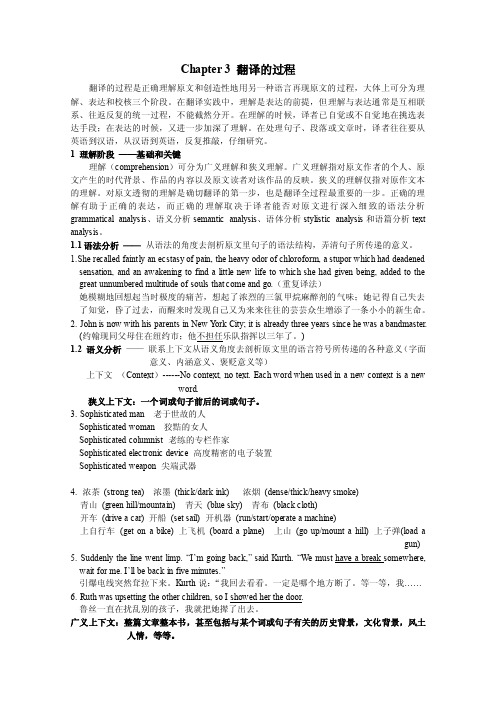
Chapter 3 翻译的过程翻译的过程是正确理解原文和创造性地用另一种语言再现原文的过程,大体上可分为理解、表达和校核三个阶段。
在翻译实践中,理解是表达的前提,但理解与表达通常是互相联系、往返反复的统一过程,不能截然分开。
在理解的时候,译者已自觉或不自觉地在挑选表达手段;在表达的时候,又进一步加深了理解。
在处理句子、段落或文章时,译者往往要从英语到汉语,从汉语到英语,反复推敲,仔细研究。
1 理解阶段——基础和关键理解(comprehension)可分为广义理解和狭义理解。
广义理解指对原文作者的个人、原文产生的时代背景、作品的内容以及原文读者对该作品的反映。
狭义的理解仅指对原作文本的理解。
对原文透彻的理解是确切翻译的第一步,也是翻译全过程最重要的一步。
正确的理解有助于正确的表达,而正确的理解取决于译者能否对原文进行深入细致的语法分析grammatical analysis、语义分析semantic analysis、语体分析stylistic analysis和语篇分析text analysis。
1.1语法分析——从语法的角度去剖析原文里句子的语法结构,弄清句子所传递的意义。
1.She recalled faintly an ecstasy of pain, the heavy odor of chloroform, a stupor which had deadened sensation, and an awakening to find a little new life to which she had given being, added to the great unnumbered multitude of souls that come and go.(重复译法)她模糊地回想起当时极度的痛苦,想起了浓烈的三氯甲烷麻醉剂的气味;她记得自己失去了知觉,昏了过去,而醒来时发现自己又为来来往往的芸芸众生增添了一条小小的新生命。
翻译的过程

一、正确理解 (Comprehensive Reading)
理解就是透彻地了解、懂得、掌握原文 所表达的内容和实质,包括词义、句义、段义、 语义。没有对原文的全面理解,翻译就无从下手; 理解不深不透,译文就不忠不顺。理解必须通览 待译文的全文,熟悉全文风貌,掌握内容大意, 摸清所涉及的具体人物、事件、背景,搞懂语言 现象,辨明逻辑关系。
5
准确理解是确切表达的前提,理解的诸多 方面如图所示。词义的选择
固定搭配、成语、短语、惯用词组 理解 歧义 矛盾修辞 逻辑关系 夸张 重复 平行结构 正确理解语言现象, 不仅要了解句子的字面意义,还要 了解句子的内涵意义。必须上下有联系地、全面地理解原 文的词汇含义、语法关系和逻辑修辞。不能孤立地看待一 句一词,因为同一个词或一个词组,在不同的上下文和不 同的语法结构中,往往有不同的含义。有时不同词义的词 却被认为是同义词,而同一词在不同的上下文中又产生了 不同的含义。 6 篇章 段落 词句
下述段落的主题句则在其中间: 10) She says while the demand for IT executives has dipped somewhat in the past few months, companies are still desperately seeking CIO candidates. Such demand has inflated CIO pay packages to between $1.5 and $3 million a year, on par with salaries of chief financial officers and chief operating officers. But even when they do pay such sums for these sought-after executives, some companies still don't seem to understand the logic of giving full play to the potential of the role. "In Asia, the title is being adopted but not all its functions," says Jason. "Many companies just pay lip-service to the importance of technology and don't let CIOs do their jobs. It's meaningless for a company to have a CIO then."
- 1、下载文档前请自行甄别文档内容的完整性,平台不提供额外的编辑、内容补充、找答案等附加服务。
- 2、"仅部分预览"的文档,不可在线预览部分如存在完整性等问题,可反馈申请退款(可完整预览的文档不适用该条件!)。
- 3、如文档侵犯您的权益,请联系客服反馈,我们会尽快为您处理(人工客服工作时间:9:00-18:30)。
主题:翻译过程:理解与表达(注意最后是翻译练习啊!)The Process of translationAccording to Nida, difference in translation can generally be accounted for by three basic factors in translating: (1) the nature of the message, (2) the purpose or purposes of the author and, by proxy, of the translator, and (3) the type of the audience. (Nida, 1964: 156)奈达:分析、传译、重组、检验The four basic processes in translating consist of (1) analysis of the source text, (2) transfer from source to target language, (3) restructuring in the target language, and (4) testing of the translated text with persons who represent the intended audience.(Nida, 2001: P. 108)中国传统方法:理解、表达、审校理解与翻译理解是语义辨析、语法分析和逻辑分析相互交叉的过程。
语义辨析就是识别词语的本义和喻义、搭配意义和情感意义、语法意义和语用意义等。
语义辨析1.根据词义搭配确定词义吃官司(be bought to court)吃回扣(accept a kickback)吃馆子(eat out; dine out)吃亏(suffer losses)吃枪子(be hit by a bullet)吃得开(be popular)吃闲饭(unemployed and without income)吃香(popular)(1) 老战士(2) 老领导(3) 老师傅(4) 老闺女(5) 老黄牛(6) 老芹菜(7) 老皇历(8) 老生常谈(1) 老战士a veteran (2) 老领导a senior leader(3) 老师傅a master craftsman(4) 老闺女the youngest daughter(5) 老黄牛a willing ox(6) 老芹菜overgrown celery(7) 老皇历last year's calendar(8) 老生常谈commonplace申请书报告书协议书成绩通知书(使用)说明书旅行委托书成交确认书电视机使用说明书白皮书家书无巧不成书letter of application;report; agreement;grade report;direction;booking form;sales confirmation;television operation guide;white book;a letter from home;no coincidence, no stories2.根据词类确定词义留得青山在,不怕没柴烧。
As long as green mountains exist, there will be no shortage of firewood.While there is life, there is hope.事在人为Human effort is the decisive factor.父母都在Both parents are still around.事情发生在去年。
It happened last year.3. 根据语境判断词义青出于蓝而胜于蓝青布the indigo blue is bluer than the plant it comes from--the pupil surpasses the master The new coming from the old is better than the old.4. 根据专业和场合确定词义沙眼管子有沙眼(small whole) 眼睛患有沙眼病(trachoma)语法分析表层结构逻辑分析深层含义“打扫卫生”“养病”“吃食堂”“救火”“修复皱纹”(眼霜)你不去我去“你去哪?吃饭没?”(功能分析)利用语法知识分析语句意义这本书我读了三天了。
这本书我读了三天。
利用逻辑知识分析语句内在逻辑明枪易躲,暗箭难防。
(转折)It is easy to dodge a spear in the open, but hard to guard against an arrow shot from hiding.)路遥知马力,日久见人心。
(并列)As a long road tests a horse’s strength, so a long task proves a person’s heart.)人无远虑,必有近忧。
If a man takes no thought about what is distant, he will find sorrow near at hand.)从语义和行文的角度对汉语流水句进行断句汉语流水句这一生动说法是吕叔湘先生提出来的,他曾指出,“汉语口语里特多流水句,一个小句接一个小句,很多地方可断可连” (吕叔湘,1979:27)。
这种句式汉译英的要点是理清其语义和关系,加以拆译,添加必要连接词语以体现英语句子之间逻辑关系的显性连接和汉语的隐性连贯.He was a handicapped child,but he persevered in his studies,and later he became a well-known scholar.他身残志坚,坚持学习,后来成为有名得学者。
When Chou En-lai’s door opened they saw a slender mall of more than average height with gleaming eyes and a face so striking that it bordered on the beautifu1.(Agnes Smedley:The Great Road)周恩来的房门打开了。
他们看到一位身材修长的人,比普通人略高,目光炯炯,面貌引人注目,称得上清秀。
通过语境对汉语歧义句进行分析父在母先亡。
教师的平均工资应当不低于或高于国家公务员的平均工资水平。
怎样理解原文?一、要理解原文语句的内部关系二、要理解特殊语言现象的特殊含义:三、要结合上下文语境进行理解四、要通过吃透词语含义进行理解五、要明确词语的具体指代进行理解六、要理解词语不同用法时的不同含义七、要注意省略和替代部分的理解怎样表达译文?一、要摆脱原文语句结构的影响二、要避免照搬英汉词典中的释义三、要充分运用汉语独特的表达优势四、要完整无遗地传达原文的意义五、遣字造句要结合和借鉴语景六、要善于运用各种翻译技巧怎样理解原文?德国译学教授Wolfram Wilss说:Translating requires the syntactic, semantic, stylistic and text-pragmatic comprehension by the translator of the original texts.(翻译过程要求译者在句法、语义、文体和语篇语用各方面对原文的进行理解。
)一、要理解原文语句的内部关系:【例34】He ate his savory, and hurried the maid as she swept the crumbs.×他一边吃着最后的一道消食小吃,一边催促女佣人赶快打扫碎屑。
【译文】他吃完最后的一道消食小吃,在女佣人打扫碎屑时,催她快一点。
【例35】Derek fancies himself as a ladies’ man, but he spends too much time admiring himself in the mirror for my liking.×德里克自以为是讨女人喜欢的人,可是为了讨我喜欢,他却花很多时间在镜子面前自我欣赏。
【译文】德里克自以为是个讨女人喜欢的人,可是我不喜欢他花那么多的时间在镜子面前自我欣赏。
二、要理解特殊语言现象的特殊含义:【例36】John is now with his parents in New York; it is three years since he was a high school teacher in Washington.【例37】She didn't attend the meeting because she wanted to.三、要结合上下文语境进行理解:No context, no text.Each word when used in a new context is a new word.狭义上下文:一个词或句子前后的词或句子。
广义上下文:整篇文章整本书,甚至包括与某个词或句子有关的历史背景,文化背景,风土人情,等等。
【例44】Managers face a host of new business realities, such as changing patterns of employment that include an explosion of outsourcing and new alliances.×管理人员面对的是商界前所未有的种种现实,诸如就业的模式不断变化包括外购、重组等现象的猛增。
【译文】管理人员面对的是商界前所未有的种种现实,诸如企业用工方式的不断变化,包括大幅度增加外部采办和新建联产单位。
四、要通过吃透词语含义进行理解:【例45】While many women are comfortable being close and sharing secrets, men often struggle to express their emotions in relationship with other men.【例46】On the drunken occasion in question, I was insufferable about liking you, and not liking you. I wish you would forget it.五、要明确词语的具体指代进行理解:【例51】"Heaven bless you, my child," said she, embracing Amelia, and scowling the while over the girl's shoulder at Miss Sharp. "Come away, Becky," said Miss Jemima, pulling the young woman away in great alarm.六、要理解词语不同用法时的不同含义:【例54】Anyone who doubts that global financial markets control national economies need only look at the crisis facing the "tigers" of the Far East.×任何认为全球金融市场未必能左右国民经济的人,只须环视一下笼罩着远东“四小龙”的那场金融危机。
